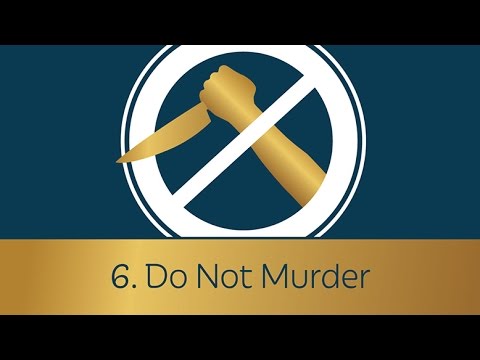The Bible begins with the living God who creates living beings, everything is his, for him and for him (Romans 11:36). Everything in life owes it its existence. He encourages all things. In short, he is the God of life, a living God who generates living beings, even when the devil tried to thwart his live broadcast by introducing death, spiritual and physical, God conquered him through Jesus, in it was life (John 1. 4) and this life was like the dawn of a new day that brings light to all men and dispels the darkness of evil (1 John 2. 8). In Jesus and through his mighty resurrection to life, God insufferes new life in a dark and fallen world (2 Corinthians 5:17).
All this is behind the two words and six consonants of the Hebrew text of Exodus 20:13. It was written as simply as in our Portuguese Bible and with remarkable brevity: “Tyle will not kill”. Of the three Hebrew words used in the Holy Scriptures to describe the loss of life, exodus 20:13 is rarely used and much more specific. Usually, but not always, it is used in reference to what we call “homicide”. Murder isn’t just about taking someone’s life, it’s about taking someone’s life, this, of course, means that not all murders are forbidden, there are cases like self-defense, just war, the death penalty and others, where death is not only allowed, but obligatory.
- To take a life unjustly is to do the devil’s work; is to introduce death to a place to which it does not belong; is to act against the way God works.
Speaking of God’s work, this commandment also guides us positively: not only should we not take someone’s life unjustly, but we must also work with God for the preservation, protection, and promotion of life.
If help is in our hands to preserve the lives of others, we are obliged to use it faithfully, to seek everything necessary for their peace of mind, so that the harmful may be overcome; if he is in danger, approach him [1].
Because God is the God of life and because we are his children and those of us who walk like him (1 John 2:6), we are necessarily the ones who work for the preservation, protection, and promotion of life, so this commandment is deeply rooted in divine nature. .
However, it also has its roots in human nature. Humanity is made by nature in the image of God. Men reflect God in a way that animals and plants do not. Therefore, they deserve a greater degree of respect and even reverence than anything else in creation. A human being’s life must not be taken in vain or in vain.
Since men were created in the image of God, we are, in a very broad and general sense, members of the same family that we agree with each other. “Man is both the image of God and our flesh. [?] Unless we want to, strip ourselves of humanity, should we favor [man] as the flesh itself?(Calvin). [2] To take the life of a member of our community unfairly is to erase a small part of ourselves; it’s like taking a member of our own family’s life.
Even more deeply, Jesus appeals to this commandment and teaches us that it is not only about holding our hands, but also about sustaining our hearts.
They heard that the elders were said: Thou shalt not kill; e: Anyone who will kill will be tried. But I tell you that anyone [for no reason] who is angry with his brother will be judged; and whoever insults his brother will be tried by the court; and anyone who calls him foolish will be subjected to hell of fire (Matthew 5. 21-22).
It is in the mind and in the heart that murder is conceived. “See if it is possible to get angry at your brother without burning for a harmful desire?(Calvin). [3] To follow this commandment is to live in peace and peace. “joy of unity and reconciliation.
We cannot even think of taking someone’s life unjustly without thinking of Christ, whose life has been lost by wicked and unjust men. The need to preserve, protect, and promote life was largely overlooked when our Savior was crucified. However, God worked there, satisfaciendo. su anger against sin and preserving his righteousness by forgiving men and women like us, who unjustly took the lives of others with our words, in our hearts, and through our hands. And it is this grace that motivates us to be a people of life, working with all the strength in us to preserve, protect and promote life, for the glory of God.
The Reverend Brian Tallman is pastor of the New Life Presbyterian Church (PCA) in La Mesa, California, USA. But it’s not the first time
[1] N. T. : Joel Calvino. La institution of the Christian religion. Volume I. Trad. Carlos Eduardo de Oliveira. Sao Paulo: UNESP, 2008, p. 382 (II, VIII, 39).
[2] N. T. : Joel Calvino. La institution of the Christian religion. Volume I. Trad. Carlos Eduardo de Oliveira. Sao Paulo: UNESP, 2008, p. 383 (II, VIII, 40).
[3] N. T. : Joel Calvino. La institution of the Christian religion. Volume I. Trad. Carlos Eduardo de Oliveira. Sao Paulo: UNESP, 2008, p. 382 (II, VIII, 39).
By: Brian Tallman. © 2015 Faithful Ministry. Original: You shall not kill.
This article is part of the June 2015 issue of Tabletalk magazine
Translation: Vin-cius Silva Pimentel. Review: Vin-cius Musselman Pimentel. © 2014 Faithful Ministérium. All rights reserved. Website: MinistryFiel. com. br. Original: You will not kill.
Authorizations: You are authorized and encouraged to reproduce and distribute this material in any format, provided that the author, his ministry and translator are no longer no longer modified and not used for commercial purposes.

